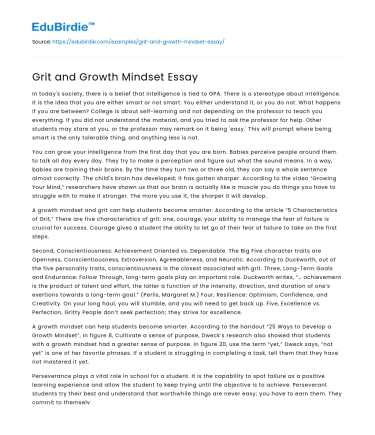In today's society, there is a belief that intelligence is tied to GPA. There is a stereotype about intelligence. It is the idea that you are either smart or not smart. You either understand it, or you do not. What happens if you are between? College is about self-learning and not depending on the professor to teach you everything. If you did not understand the material, and you tried to ask the professor for help. Other students may stare at you, or the professor may remark on it being 'easy.' This will prompt where being smart is the only tolerable thing, and anything less is not.
You can grow your intelligence from the first day that you are born. Babies perceive people around them to talk all day every day. They try to make a perception and figure out what the sound means. In a way, babies are training their brains. By the time they turn two or three old, they can say a whole sentence almost correctly. The child's brain has developed; it has gotten sharper. According to the video “Growing Your Mind,” researchers have shown us that our brain is actually like a muscle you do things you have to struggle with to make it stronger. The more you use it, the sharper it will develop.
A growth mindset and grit can help students become smarter. According to the article “5 Characteristics of Grit,” There are five characteristics of grit: one, courage, your ability to manage the fear of failure is crucial for success. Courage gives a student the ability to let go of their fear of failure to take on the first steps.
Second, Conscientiousness: Achievement Oriented vs. Dependable. The Big Five character traits are Openness, Conscientiousness, Extroversion, Agreeableness, and Neurotic. According to Duckworth, out of the five personality traits, conscientiousness is the closest associated with grit. Three, Long-Term Goals and Endurance: Follow Through, long-term goals play an important role. Duckworth writes, “… achievement is the product of talent and effort, the latter a function of the intensity, direction, and duration of one’s exertions towards a long-term goal.” (Perlis, Margaret M.) Four, Resilience: Optimism, Confidence, and Creativity. On your long haul, you will stumble, and you will need to get back up. Five, Excellence vs. Perfection, Gritty People don’t seek perfection; they strive for excellence.
A growth mindset can help students become smarter. According to the handout “25 Ways to Develop a Growth Mindset”, In figure 8, Cultivate a sense of purpose, Dweck’s research also showed that students with a growth mindset had a greater sense of purpose. In figure 20, use the term “yet,” Dweck says, “not yet” is one of her favorite phrases. If a student is struggling in completing a task, tell them that they have not mastered it yet.
Perseverance plays a vital role in school for a student. It is the capability to spot failure as a positive learning experience and allow the student to keep trying until the objective is to achieve. Perseverant students try their best and understand that worthwhile things are never easy; you have to earn them. They commit to themselves, set realistic goals, and never give in to frustration or failure.






 Stuck on your essay?
Stuck on your essay?

